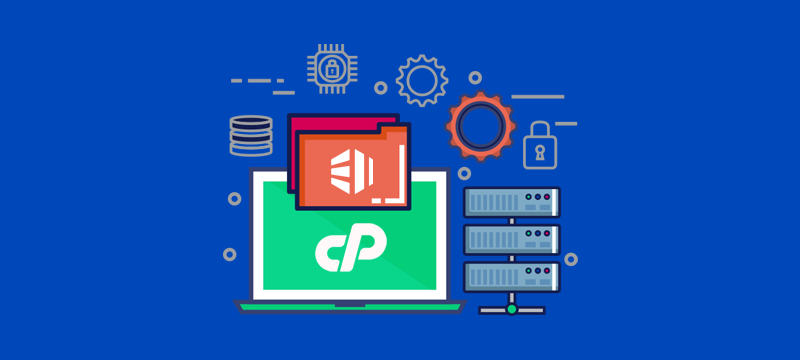The cPanel control panel is the leading web hosting control panel on the market today. Designed for use on Linux operating systems, it is often used for managing the hosting of WordPress, Magento, Drupal, Joomla and similar websites.
With an intuitive and easy to use graphical interface, cPanel offers website owners a broad suite of tools and functions unrivalled by other Linux-based control panels. Here, we’ll provide an overview of cPanel and look at some of its main features.
An Overview of cPanel
cPanel is a control panel that enables you to carry out a multitude of website and hosting management tasks. While the admin area of your website is where you can update content, change themes, install plugins, etc., cPanel enables you to carry out higher-level tasks, managing both your website and other aspects of your hosting, as well as offering other ways to carry out some of the things that can be done in the admin area.
cPanel organises its tools into 10 easily navigable sections. These are:
- Files: for managing your website files and disk space.
- Databases: for managing your databases.
- Domains: for managing your domains and DNS.
- Email: For managing email, email security, contacts, etc.
- Metrics: For viewing website data, such as visitor numbers and resource usage.
- Security: a suite of tools for securing your site, such as 2FA and SSL.
- Software: to manage PHP, web platforms and to install new apps.
- Advanced: More complex tools for things like cron jobs, error pages, etc.
- Preferences: for cPanel management, such as user manager, passwords and interface personalisation.
- Softaculous App Installer: Softaculous is a tool that lets you install hundreds of tools/apps directly from cPanel.
The Main Features of cPanel :
- Email
cPanel’s email tools help you to manage your email from directly within the control panel. They enable you to:- Add and remove email accounts
- Set up email forwarding, mailing lists and auto-responders
- Manage spam filters and global filters
- Encrypt emails for security
- Read and compose emails anywhere in the world via Webmail.
- FTP Manager
The FTP manager can be used to manage FTP access to your server directories and files. Features include:- Set up FTP accounts
- Set up anonymous FTP access
- FTP session control
- File Manager
The File Manager makes managing your files even easier than using FTP as you can do it directly from an interface within cPanel. You won’t need to make an FTP connection, use an FTP program or create additional usernames and passwords. - Backup
Backups are essential to help you recover from lost data, corrupted files, hardware failure and cybercrime. cPanel has built-in backup functionality that lets you create a backup of your website with a single click, download it, and store it remotely from your server. - Domains
cPanel gives you complete control over your domains. It enables you to manage your domains and DNS settings, add new domains and subdomains, publish domains once your websites are completed, set up domain aliases and redirects. - Raw Log Manager
The Raw Log Manager lets you choose how raw logs are stored on your hosting account. - Raw Access Log
cPanel gives you the ability to download the raw access logs for any domain in your account. This information is useful for tracking user movements. - Error Log
cPanel’s Error Log helps you get to the bottom of 404 errors. The log displays all the 404 File does not exist errors, helping you discover which files are missing from your website and quickly replace them or remove broken links. - MySQL Databases
CMS websites require a MySQL database and you may have multiple databases if you have more than one domain. The MySQL Databases tool enables you to manage your databases, creating new ones, modifying existing ones and creating, managing and removing database users. - Two Factor Authentication (2FA)
Take your cPanel security up a level by using the control panel’s 2FA tool. This will require anyone logging into your cPanel account to use an additional method of verification, sent to their phone, besides the username and password. 2FA helps prevent unauthorised users or brute-force hackers from gaining access to your control panel. - Softaculous
Make the installation of applications a breeze with Softaculous. Softaculous enables you to install hundreds of useful apps and tools, quickly and easily, to improve your website’s functionality.
From CMS, such as WordPress, Joomla, Drupal, Magento, etc, popular eCommerce platforms, image galleries, social media tools, blogging tools, forums, ad managers, calendars, user polls, project management tools, customer support tools and many more – all installed with a single click!
Conclusion
There are many more useful features available in cPanel. With such a rich variety of features, it’s no wonder that cPanel is the world’s most-used control panel.
For more information, see our cPanel hosting packages.



